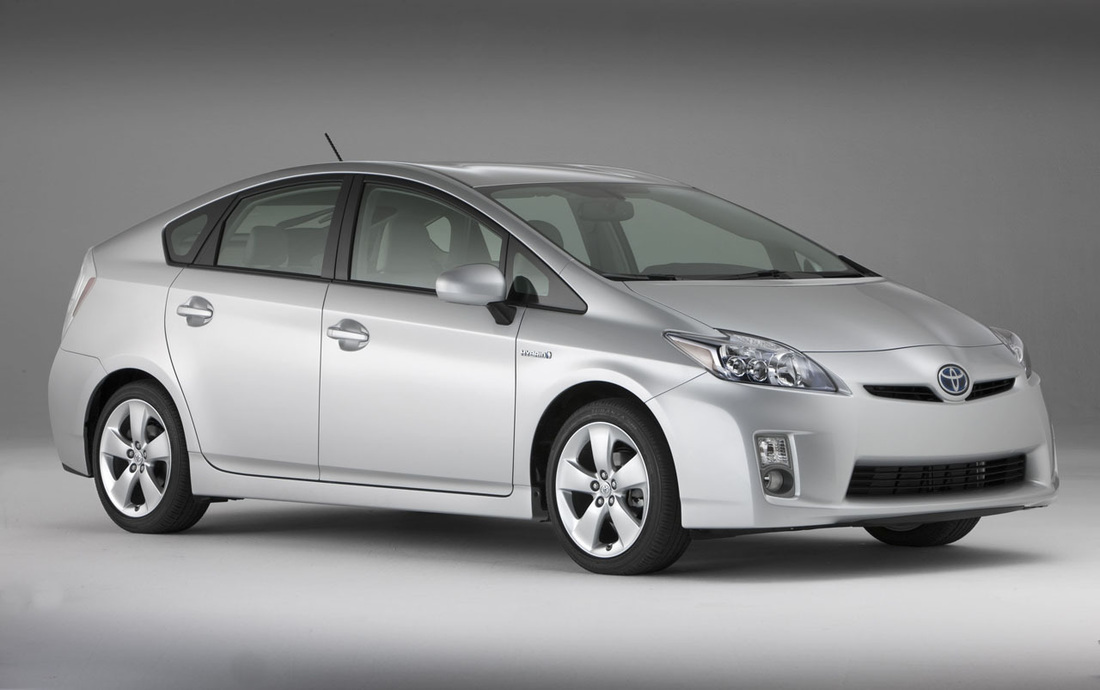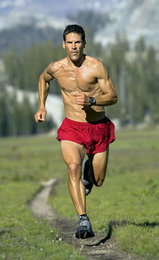It may seem like I give running a lot of hate. In my articles "3 Reasons Running Doesn't Work Burning Fat" and "5 Reasons Your Idea Of Female Fitness Is Bogus," I’ve discussed the pitfalls of running. However, I’m here to clear the air about it.
Running is fantastic. As humans, we’re at the top of the food-chain specifically because we can run on two feet, have huge brains, can see for long distances, and have an efficient cooling system (sweat) that other mammals don’t have. If a cheetah is a Lamborghini, we’re a Prius. Sure, the cheetah will get there first, but we don’t ever really need to stop. FUN FACT: cheetahs can overheat so much their brains literally fry in their skulls. (If you don’t believe me, check out http://www.montana.edu/screel/Webpages/Bio%20303/411lec22.PDF)
With all this buildup, here are some reasons why efficient running turns you into a Prius.
1. Humans don’t have predisposed limitations.
This is our preface. In summary, you can take the most genetically “perfect” gazelle in existence and it can still be outdistanced by humans. And not even the most genetically “perfect” humans. Yes, it’s extremely difficult for a human to run continuously; the thing is, you’re not limited by your species. With proper time, training, nutrition, and rest, you can exceed most limitations (in the field of running). We may not all be Dean Karnazes, but we can do some amazing things. Plus, what “machine” can you think of that adapts? Most machines are limited to the confines of their development. Like the T-1000 in Terminator 2 (which was terrifying), we can change and become better. For more elaboration,
2. Running builds cardiovascular endurance.
Humans developed the way they did specifically to chase down prey. Instead of developing extreme reflexes or top speeds, we developed the most efficient cooling system and energy expenditure regulation systems compared to our “peers.” Sure, a gazelle can run faster, but at some point it will have to stop to cool itself off. In this time, we’re easily jogging to keep up. If the gazelle gets a second wind, it will then outpace us again. Guess what? We’ve got portable water and food. We don’t ever really need to stop. We eventually catch up, do our thing, and head back home with food for a month.
Check out this short video, narrated by the ever wise Sir Attenborough, of a tribal member utilizing “Persistence Hunting.” https://www.youtube.com/watch?v=826HMLoiE_o
Besides just building endurance alone,
3. Running, compared to other cardiovascular training methods, promotes higher bone density.
When bones are influenced by impact, they receive minute damages that, over time, repair and give bones strength. Swimmers and cyclists are comparable with runners in cardiovascular endurance, but due to the nature of their training, have significantly less bone density. http://munews.missouri.edu/news-releases/2009/0226-hinton-bone-density.php
As you age, bone density is extremely important (and in women especially). Genetics and lifestyle habits are good indicators for bone health over time, but everyone at some point will suffer from a loss of muscle mass, flexibility, and bone density. Women are already predisposed to less muscle mass, lower bone density, and are already at higher risk for osteoporosis. So while men may fall and bruise their hip, women snap, crackle, and pop. While swimming and cycling provide great cardiovascular training, learning proper running mechanics and introducing impact to your body will stave off many of these negatives (women, I'm emphasizing that you do this. This is in italics so you know I'm serious.). Also, besides promoting bone density and cardiovascular endurance, perhaps the best benefit to running is,
4. It costs you nothing… and is great for the brain.
Take a peek at this article right quick (or at least the title): http://www.health.harvard.edu/mind-and-mood/exercise-and-depression-report-excerpt
Everyone at any time can fall victim to depression. It can be temporary or long term, and one can be perpetually predisposed to its effects. Depression is a common ailment and as such shouldn’t hold any stigma; we have highly developed brains which sometimes, just like anything else, can get operational errors.
Exercise has been proven time and again to staving off these degenerative disorders. Since running is the most natural exercise one can do, I recommend everyone to do it. Admittedly I’m not the most avid runner and personally don’t prescribe it to most people. However, most people don’t fall in the category to just hop up and run if I tell them to. It’s much more difficult to fine-tune someone’s mechanics, build proper posterior chain strength, increase hip flexibility and endurance, and work up to running longer distances, than it is to put them on the elliptical and kick their butts.
This doesn’t alleviate the fact that we have to be able to run. There are a million reasons why we should be able to pick our feet up faster and get to a destination quickly; earthquakes, typhoons, car accidents, Sharknadoes, skunks, bears, or closing elevators just to name a few.
Running is fantastic. As humans, we’re at the top of the food-chain specifically because we can run on two feet, have huge brains, can see for long distances, and have an efficient cooling system (sweat) that other mammals don’t have. If a cheetah is a Lamborghini, we’re a Prius. Sure, the cheetah will get there first, but we don’t ever really need to stop. FUN FACT: cheetahs can overheat so much their brains literally fry in their skulls. (If you don’t believe me, check out http://www.montana.edu/screel/Webpages/Bio%20303/411lec22.PDF)
With all this buildup, here are some reasons why efficient running turns you into a Prius.
1. Humans don’t have predisposed limitations.
This is our preface. In summary, you can take the most genetically “perfect” gazelle in existence and it can still be outdistanced by humans. And not even the most genetically “perfect” humans. Yes, it’s extremely difficult for a human to run continuously; the thing is, you’re not limited by your species. With proper time, training, nutrition, and rest, you can exceed most limitations (in the field of running). We may not all be Dean Karnazes, but we can do some amazing things. Plus, what “machine” can you think of that adapts? Most machines are limited to the confines of their development. Like the T-1000 in Terminator 2 (which was terrifying), we can change and become better. For more elaboration,
2. Running builds cardiovascular endurance.
Humans developed the way they did specifically to chase down prey. Instead of developing extreme reflexes or top speeds, we developed the most efficient cooling system and energy expenditure regulation systems compared to our “peers.” Sure, a gazelle can run faster, but at some point it will have to stop to cool itself off. In this time, we’re easily jogging to keep up. If the gazelle gets a second wind, it will then outpace us again. Guess what? We’ve got portable water and food. We don’t ever really need to stop. We eventually catch up, do our thing, and head back home with food for a month.
Check out this short video, narrated by the ever wise Sir Attenborough, of a tribal member utilizing “Persistence Hunting.” https://www.youtube.com/watch?v=826HMLoiE_o
Besides just building endurance alone,
3. Running, compared to other cardiovascular training methods, promotes higher bone density.
When bones are influenced by impact, they receive minute damages that, over time, repair and give bones strength. Swimmers and cyclists are comparable with runners in cardiovascular endurance, but due to the nature of their training, have significantly less bone density. http://munews.missouri.edu/news-releases/2009/0226-hinton-bone-density.php
As you age, bone density is extremely important (and in women especially). Genetics and lifestyle habits are good indicators for bone health over time, but everyone at some point will suffer from a loss of muscle mass, flexibility, and bone density. Women are already predisposed to less muscle mass, lower bone density, and are already at higher risk for osteoporosis. So while men may fall and bruise their hip, women snap, crackle, and pop. While swimming and cycling provide great cardiovascular training, learning proper running mechanics and introducing impact to your body will stave off many of these negatives (women, I'm emphasizing that you do this. This is in italics so you know I'm serious.). Also, besides promoting bone density and cardiovascular endurance, perhaps the best benefit to running is,
4. It costs you nothing… and is great for the brain.
Take a peek at this article right quick (or at least the title): http://www.health.harvard.edu/mind-and-mood/exercise-and-depression-report-excerpt
Everyone at any time can fall victim to depression. It can be temporary or long term, and one can be perpetually predisposed to its effects. Depression is a common ailment and as such shouldn’t hold any stigma; we have highly developed brains which sometimes, just like anything else, can get operational errors.
Exercise has been proven time and again to staving off these degenerative disorders. Since running is the most natural exercise one can do, I recommend everyone to do it. Admittedly I’m not the most avid runner and personally don’t prescribe it to most people. However, most people don’t fall in the category to just hop up and run if I tell them to. It’s much more difficult to fine-tune someone’s mechanics, build proper posterior chain strength, increase hip flexibility and endurance, and work up to running longer distances, than it is to put them on the elliptical and kick their butts.
This doesn’t alleviate the fact that we have to be able to run. There are a million reasons why we should be able to pick our feet up faster and get to a destination quickly; earthquakes, typhoons, car accidents, Sharknadoes, skunks, bears, or closing elevators just to name a few.




 RSS Feed
RSS Feed
